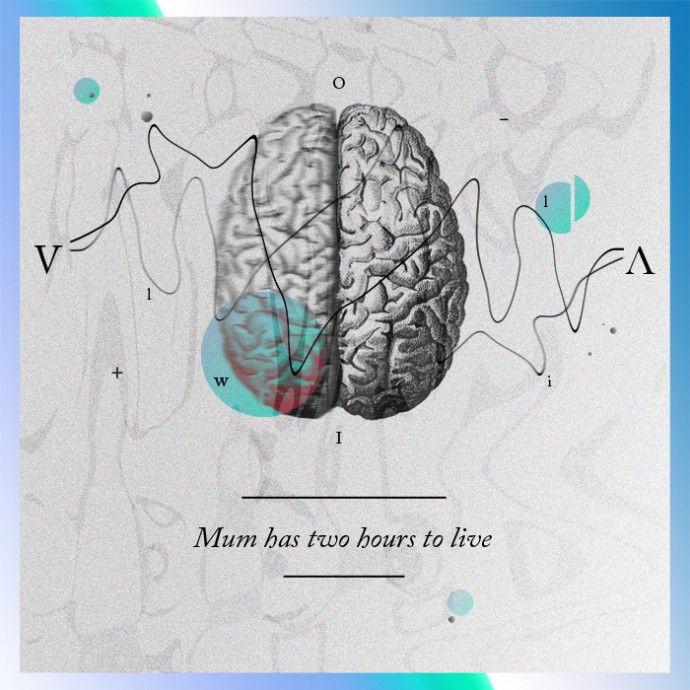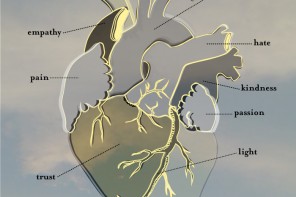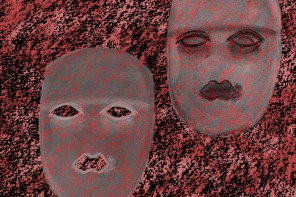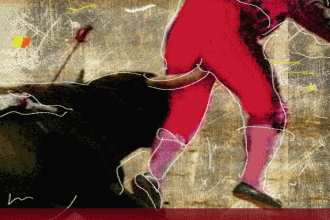Every day of our lives we run the risk of being hit by a bus, struck by lightning, or killed in an infinite number of similar freak accidents. In the Western World, we are fortunate enough to live in a society where the standard of medical care is high enough that the notion of falling suddenly ill to a fatal disease is an equally unlikely fate. Christine was in the prime of her life when she contracted Meningitis, a deadly inflammation of the brain and spine.
I was thirty-four and very healthy. I had just had a week off work, and on the Friday I had a friend around for lunch so spent all morning baking, cooking, being me. I suddenly came down with flu symptoms, and within fifteen minutes I was extremely ill, so my friend helped me up to bed.
I was frightened because of how quickly it happened; I felt very unwell and I had a lot of pain in my legs. I had had an operation on my leg on the Monday and I thought perhaps something had gone wrong, so I called the GP’s office but they just told me to carry on with my medication.
I went rapidly downhill. I organised someone to collect my daughter Natalie from school, she was only seven, my son Samuel was sixteen. He came home and I just stayed in bed. I couldn’t stop being sick, I was extremely thirsty, and I woke up the next morning with what I thought were burst blood vessels all over my body.
I was surprised at the rash so I rang the GP’s and told them I was in severe pain. The receptionist again just said, “Carry on with your painkillers,” but I didn’t have enough medication left, so I had to wake Samuel up. I was very weak at this point. It’s only now, looking back, that I realise how weak I was. I couldn’t get myself out of bed; I had to pick something up and throw it at the wall to try and wake him up.
He obviously saw the deterioration in me and wanted to call an ambulance. I thought he was just being dramatic. What I didn’t realise was at that point I was very bloated and what I had seen as burst blood vessels was actually haemorrhaging under the skin. My face was really swollen, and I had blood patches all over, so Samuel was obviously really frightened.
Samuel rang my friend. She came to the house, called an ambulance and explained to them the symptoms. The ambulance got to me in three and a half minutes because they understood how severe it was at that point.
I was taken to hospital and they said they thought I had Septicaemia, so they were going to check the fluid in the base of my spine. It was Samuel who said, “Mum, you have Meningitis.”
I thought to myself, “I’m going to stay awake, because if I stay awake I’m alive and I’m okay,” and I had to be alive for the kids because I was their only parent. I told Samuel that he wasn’t to worry about me, that I was going to be okay. They rushed me down for a brain scan and I was trying to read the signs along the corridor to keep myself alert. As they lifted me to put me in for the scan, I had a seizure and fell into a coma.
I thought to myself, “I’m going to stay awake, because if I stay awake I’m alive and I’m okay,” and I had to be alive for the kids because I was their only parent.
I ended up on life support and was being given constant blood transfusions, but there was no hope whatsoever; I was too far gone. My kidneys had failed and my lungs collapsed very quickly. Samuel phoned my family and said, “Mum has two hours to live,” because that’s what he had been told. They said, categorically, I was not going to survive.
My family got the first flight over from Dublin at 6am the next morning. I was bloated beyond recognition, and when they arrived the nurses wouldn’t let them come in straight away because they needed to council them to prepare them that they were not going to recognise me.
My parents came in first and my dad said to me, “What’s all this dramatic attention seeking? I’ve been up all night you know!” And apparently the nurse started to laugh. My dad said as much as he was joking, he was surprised to hear someone laughing. The nurse told him to look at the monitors over my head. She said, “Nothing is happening now because she doesn’t know me, but speak and watch her response when she recognises your voice.” Dad said he saw the monitor going up and down, and he thought, “That gives me hope.”
That was the Sunday, and it was my birthday on the Tuesday. Every day the medical staff were adamant I wasn’t going to survive. My head was so swollen that they couldn’t check the vital signs in my eyes; they couldn’t open my eyelids to see what was going on.
On my birthday, my mum sat with me and she said to me that she wasn’t going to sing Happy Birthday to me; she was going to wait until I came home. She told me that everybody loves me, and the whole of Ireland was praying for me, as were all our friends in America. She said I would never have known it but she was crying, and when she looked across to the intensive care nurse, she too was silently crying. Mum said she looked at me and I had one tear coming down my face, and she thought, “That gives me hope. She is actually in there; she’s listening to us.”
Mum said she looked at me and I had one tear coming down my face, and she thought, “That gives me hope. She is actually in there; she’s listening to us.”
My brother said that I didn’t like the tube going down my neck to the ventilator; I was like a horse, always trying to move my head to get it out. When they took the ventilator out, they were using a black pump to put some air into my lungs, but my lungs weren’t kicking in naturally. The nurse said, “Christine, you’ve got to get your lungs going properly or the tube is going to have to go back in, and I know you don’t like it.” My brother said there was a flash over my face and three seconds later I started breathing on my own.
After six days in the coma I woke up. There were three nurses at the end of the bed, all smiling at me, and the middle one said, “You don’t know what day today is, do you? It’s Friday the 17th of January,” and I said, “I don’t believe it—I’ve missed my birthday!” I was so annoyed with myself that I’d missed my birthday, and so annoyed that I’d given in and gone to sleep, because I was so determined to stay awake.
My mum and my sister walked in and they started to tell me a few little things. I’d heard that Samuel had been by my side the whole time. He came in to see me, so I said, “You need to get back to school!” I heard all these different stories from everyone’s perspective and I thought, “Oh my god—I can’t believe I’ve put everyone under so much stress and pressure!”
One of the symptoms of Meningitis is the aversion to bright light, so they never had any bright lights on in intensive care unit, and the curtains were always closed apart from this tiny gap that was right beside me. It was January, the blue skies were cloudless, and it was absolutely beautiful. I would think, “Wow, I should be dead. Oh my god, I’m alive—alive to see this blue sky!” And I still feel that.
Just look how lucky we are to have the simple things in life: watching your children, the blue sky, just being alive. I told everyone that I loved them. We tell our family that we love them, but we very rarely tell our friends. After that, there wasn’t a friend that I didn’t tell.
I was left with a major walking problem, but I always found the funny side to not being able to walk. I thought, “It doesn’t matter, because I’m here.”
I asked the physiotherapist when I was going to be able to walk again, and he said, “You’re never going to be able to walk properly, and you won’t work again— you have to accept this.” For the first time I started crying, and he said, “Why are you crying; did your family not tell you how severe this was?” And I said, “Yes, but I missed it; I slept. That wasn’t my journey.”
I was determined that I was going to walk again. I was going to have a full life. It took a huge amount of determination to fight the fatigue and to get a grip on the walking, but I did it, and I just think I’m so lucky. I now have my grandchildren, and I see so much going on around me that I could not have been here to see.
Apparently my mum said to the doctors, “She’s a very determined girl—she won’t give in,” and the doctor said, “No we’ve taken that will away from her.” I think you can never take that will away from someone; I don’t believe you ever lose your spirit. I was so determined that I had to live, because my children could not have been left without me. To me, that’s why I’m still here. Because medically, I shouldn’t be here.
I do believe that I was allowed to live for my children. I also felt that I hadn’t finished living myself. I firmly believe that I was given another chance and I met my partner, David.
I do believe that I was allowed to live for my children. I also felt that I hadn’t finished living myself.
I had actually met David a couple of months previously, but it had been a blind date. I’m not sure if we would have gotten together otherwise. I think time would have just gone on: he would have thought of me, I would have thought of him, and that would have been the end of it. He heard through my friend that I was ill and he was really upset, even though he’d only met me once. It showed me an amazing side to David.
I remember thinking, whereas if you love someone and something happens to them you’ll always love them and care for them, he fell in love with me in that state. To me, that brought out something really special in him. I feel that’s something really good that came out of the whole experience.
It has also affected decisions I’ve made; if I’ve been unhappy in a job I’ve thought, “No, my life is too precious to put up with this stress.” It’s a shame when you see other people doing things that make them unhappy, but life does get in the way. Everybody gets caught up in things. You hear people say life is too short, but they don’t live that— it’s just words. My experience makes me step back and think no, I’m not getting caught up in this. Life is too precious.







